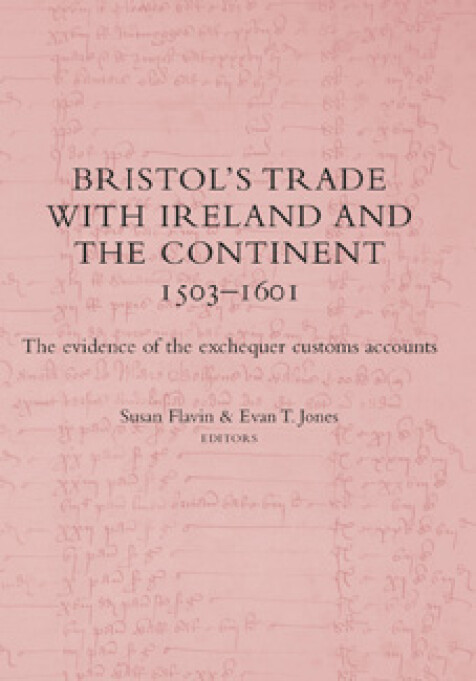Bristol's trade with Ireland and the Continent, 1503–1601
The evidence of the Exchequer customs accounts
Evan Jones & Susan Flavin, editors
'Four Courts Press, the Bristol Record Society, and the editors of this book have done early modern economic historians a great service in providing such a detailed, easily accessible volume of exchequer accounts covering trade between the port of Bristol and both Ireland and the Continent during the sixteenth century. These very thorough records, found in the National Archives, provide much detailed information, including the date of the voyage, the name of the ship and shipmaster, the type and amount of goods entering or exiting the country, the sort of customs levied, and for those products subject to “poundage”, their nominal value … A number of superb enhancements give this collection tremendous added value. There are helpful maps showing where all of the ports are located, an extremely valuable and exhaustive glossary of commodities and weights and measures, and another of place-names and their locations (co-ordinates). In addition, separate and wonderfully detailed indices of people, places, and ships are included … this is an excellent resource for future studies of early modern English economic history and an indication of the kinds of expanded access to important documents that the internet age has in store for us', Ben Lowe, Sixteenth Century Journal (2011).
‘An important contribution to scholarship on Ireland’s economy in the context of the wider Irish Sea and northwest Europe … the editors are to be congratulated for making such useful primary information available … [this book] helps elucidate the nature of trade with Ireland from the end of the Middle Ages into the early modern period … This important study has obvious implications for research into the emergence of capitalism in Ireland … Readers will discover many items of interest in the summarized information … The value of the present volume is in the exceptionally rich amount of factual information that these account records contain ... Flavin and Jones have performed a valuable service in producing this volume .. this project and its outputs represent a most valuable addition to the study of later medieval and early modern Ireland', Niall Brady, Eolas (2010).
‘Listing the duties paid to the crown for every item that arrived or departed from the country, Britain’s exchequer customs accounts provide the most complete record of any pre-modern country’s trade history. This massive volume contains copies of the extant account records for Bristol for the 16th century, providing an unparalleled raw view of the port’s trade with Ireland and the European mainland', Reference & Research Book News (May 2010)
'Two factors make [this] work remarkable, the first is that the records survive and the second that they have been reproduced in an easily accessed format ... [this work] will shed considerable light on Waterford trade ... [it] will stimulate considerable further research into early trade and shipping. It is a valuable piece of work and indicates the treasure trove yet to emerge from archives ... I have no doubt that this meticulous work will kick start several trade and shipping historical studies among serious maritime historians as well as local history study groups. The book itself is competently produced by Four Courts, the binding robust which is essential for the number of pages. The dust jacket is elegantly based on an image of the records themselves', Newsletter of the Maritime Institute of Ireland (Autumn 2009)
‘The glory of the English customs accounts is, as the editors' introduction notes, their very detail. Sometimes, this can lead in unexpected directions. This is particularly the case with the Bristol accounts which (uniquely among the English customs accounts) usually name the port of origin or destination of each ship. Consequently, one can identify the merchandise coming in from or going out to Bristol's overseas markets. The editors use this unique information to argue persuasively that the Bristol accounts are our best surviving source for Irish economic history, since the Irish trade played a major role in Bristol's commerce. Indeed, they demonstrate that before and during the Nine Years War (1594–1603) the Irish economy was much more developed than had been thought previously (notably by Ada Longfield and Wendy Childs). Far from solely exchanging fish and animal skins for English manufactured goods and continental re-exports, the Irish increasingly shipped manufactured goods to Bristol and imported sophisticated consumer goods. As their trade volume expanded, commercial exchanges between Bristol and the southern Irish ports came to be dominated by Irish merchants … This is not the only revision to which this edition contributes. It remains to be seen if the communis opinio is supported by a detailed study of Bristol's trade with western France and the Iberian peninsula on the basis of this edition … All in all, this is a magnificent edition, and the editors are to be congratulated', Stuart Jenks, Economic History Review (2010).
‘This substantial volume emerged from a project funded by the UK’s Economic and Social Research Council, covering the trade between Bristol and Ireland in the sixteenth century. However, it offers readers a range of evidence that extends beyond that particular trade, printing full transcripts of seven selected years between 1503 and 1551, of the “particular” accounts of Bristol’s trade, depicting the entire network created by the port’s merchants, not just with Ireland … All this information is particularly valuable since the Irish archives themselves were comprehensively destroyed when the Dublin Public Record Office was blown up in June 1922 during the civil war … the evidence of the Bristol accounts is a most valuable addition to our knowledge of English overseas trade', Pauline Croft, International Journal of Maritime History (2011).

